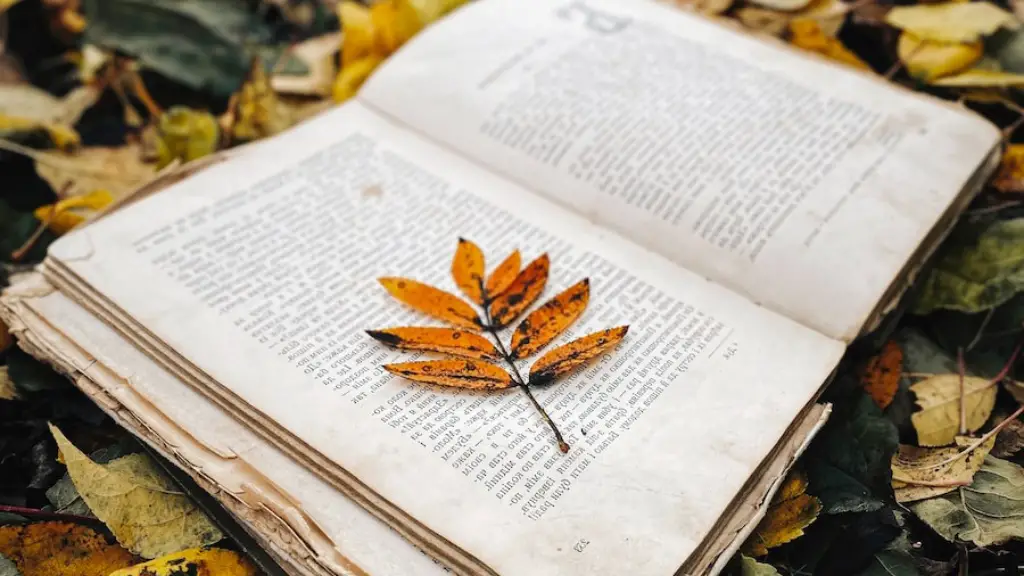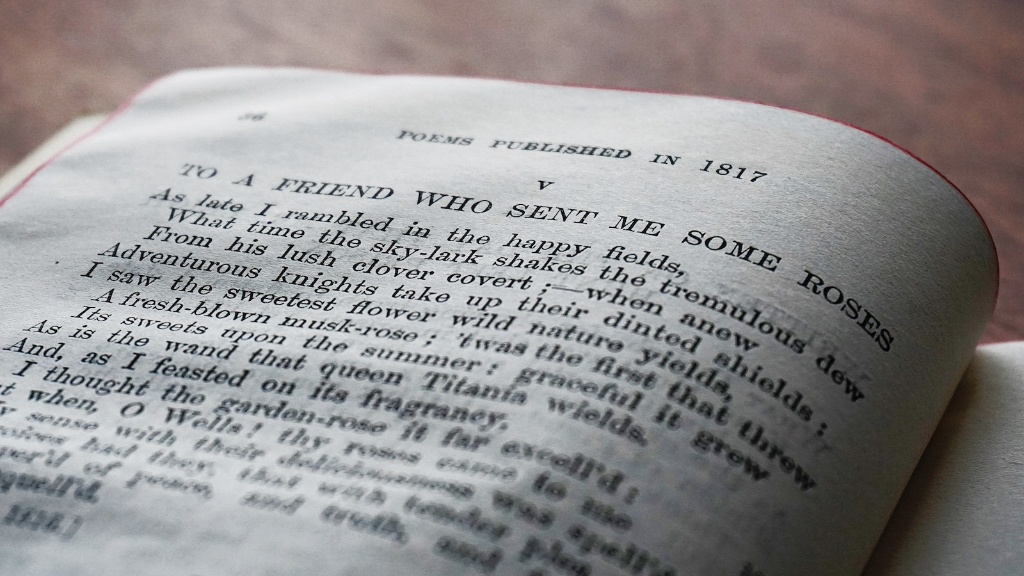British poetry is an art form steeped in history and tradition, having been around for centuries. It captures the culture and lifestyle of the people at the time and has adapted over time to represent contemporary life. It has had an impact on many other forms of art, from film and music, to visual arts and performing arts. The form of poetry includes everything from Skaldic poems and sonnets, to free verse, which has become increasingly popular in modern times.
Poetry has a certain rhythm to it that sets it apart from other forms of literature. Each poem is crafted with its own beat, whether it’s equal rhythm through the lines, or a random pattern that follows a rhythm only the poet knows. This is what gives poetry its own unique style and emotion, with some poets choosing to focus more on metaphor and imagery, while others lean more towards philosophical and social musings. The way poetry is written can be specific to an individual’s style, and often evolves as the poet does and develops their own authentic voice.
At the heart of British poetry is its use of language. All great poets use language to convey their message, but British poets also choose to use layers of ancient and modern terminology to give their works unique depth, making them more than just words on a page. Although poems can be written in any language, the British are often seen as masters of the English language and therefore, their poems gain special attention. Words are often woven together in a way that just resonates with readers on a much deeper level, or can be a source of comedy that would have been lost on readers of other nations.
British poetry also has a tendency to evoke certain emotions in readers. Some poems are powerful and moving, while others are wistful and whimsical. Through these emotions, readers gain insight into the poet’s inner world and often relate their experiences to the poet’s. It is this ability to connect and relate that makes British poetry so beloved. Not only does it allow readers to better understand the poet’s feelings, but also to gain greater insight into their own.
The beauty of British poetry is that it is ever-changing and open to interpretation. Although there are some common themes and motifs that recur throughout the ages, different poets often take their own unique take on things. This means it can remain timeless, even through shifts in culture and trends. British poets also tend to break down barriers and open up topics for discussion that may not otherwise be addressed.
British poetry is an art form that has had a lasting impact over the centuries. It has become an integral part of British culture, not only in the way it is written, but also in how it is interpreted and shared with new generations. As it continues to evolve, more diverse voices are embraced and celebrated, while still being formed within the rich tradition of British poetry.
Evolution
The evolution of British poetry is a long and varied one. Over the centuries, different motifs and themes have come in and out of style, and each has served to reflect the culture and society of the time. From epic Skaldic poems written about battles and heroes in medieval times, to the whimsical musings of the romantic era, British poetry has had a hand in shaping the way we both think and express ourselves.
In more recent years, free verse has become popular, with shorter, sparse poems focusing more on tone and rhythm, less so on structure. This type of poem is thought to have originated in the mid 19th century and paved the way for a more poetic style of speech. As the language has evolved, so too have the themes in poetry. In modern times, British poets often turn to topics such as gender equality and identity, which reflect the changing politics and more worldwide views of the modern era.
British poetry can also be seen to influence poetry in other countries, often creating a bridge between cultures. Writers such as Seamus Heaney, W.H. Auden and T.S. Elliot, to name but a few, all earned themselves renowned appeal in the US and beyond. The works of British poets often touch a nerve and inspire columnists, comedians and many other forms of art.
Modernizing
British poetry has often been able to take a timeless subject and give it a modern twist. This modernizing of a classic form has been seen in recent years, with poets such as Kate Tempest and Hollie McNish using hip-hop lyrics, beats and modern slang to make their work more accessible to a younger generation. This proves that poetry is an ever-evolving art form, not stuck in the past, but very much in the present.
British poets also explore the use of technology in their work. Many are taking advantage of the digital age and creating blogs, e-books and apps to share their work and connect with a larger audience. Platforms such as Instagram also have been used successfully in this way with poets sharing their work and creating communities, allowing them to get feedback and feedback from other like-minded poets.
Crowdsourced platforms are also emerging, where poets can collaborate on poems and get feedback from their peers. These platforms give the public and chance to get involved in the creative process and come together to create powerful and thought-provoking works of art.
Poetry slams are a recent example of the modern British poet. These slam events allow both professional and amateur poets to find an audience and showcase their talents. These events are a great way for poets to gain exposure and share their work, and often create electrifying moments as people come together to create, appreciate and share art.
Legacy
Much of British poetry is based on legacy, and it is reflected in the works of many modern-day poets. Many are building upon and nodding to the works of past poets, while also often creating new works in order to address social and political issues.
There is something within British poetry that captures the essence of the people of Britain and has enabled it to have such a lasting impact. It is testament to the talent of British poets down the centuries that it has become so heavily embedded in the culture, evoking emotions and resonating even with readers who are not native to the culture or language.
British poetry is an incredibly powerful and expressive art form that has allowed people to convey stories and emotions in an impactful and unique way. As it continues to evolve and diversify, there is an anticipation around what new ideas British poets may bring to the table, and what a lasting legacy each work will bring.
Inclusion
British poetry has historically been a reflection of the people at the time, but in recent times there has been an effort to diversify and welcome voices from the margins. This has seen an increase in support and celebration of those who have previously been overlooked.
A notable example is BAME poets, who often have to face systemic racism and discrimination in their pursuit of careers in the arts. However, there has been a conscious effort to address this imbalance, with more and more platforms being created to give a platform to diverse voices. This has included programs such as the National Poetry Competition and initiatives such as the Back British Poetry Campaign.
British poets have often been credited with helping to shape cultural and social movements through their works. This includes movements such as the Black Lives Matter movement, which has been championed by many poets who are striving to make a difference on a larger scale. Poets are often taking it upon themselves to create positive change, and it is important to recognize and support these voices.
Inclusivity and diversity have become increasingly important in British poetry, with more platforms being made available to those who have previously been excluded. This has led to an enriched landscape of voices that are more representative of Britain and its people, and a greater appreciation of the different kinds of poetry that can be created.
Collaboration
Collaboration is also a wonderful way for British poets to grow and develop. It creates a process where like-minded people can come together and create something of value. Being able to work together allows for ideas to be shared, and for poets to become more confident in their own work.
Social media and online forums have made collaborations so much easier, with poets often creating projects together remotely. This gives them the opportunity to share their unique perspectives from different places and gain a greater insight into their works. Furthermore, collaborations allow poets to break down creative barriers and create more innovative works of art.
Collaboration also can open up more conversations between poets, allowing them to explore bigger and more thought-provoking ideas. Poets often become an important part of the creative process, and having the ability to express and explore through their works allows more room for creative and creative growth.
Collaborative works have become increasingly popular, with poets often joining forces to create something truly remarkable and powerful. These projects are often highly successful, with many poets and their works receiving acclaim and reaching wider audiences.





